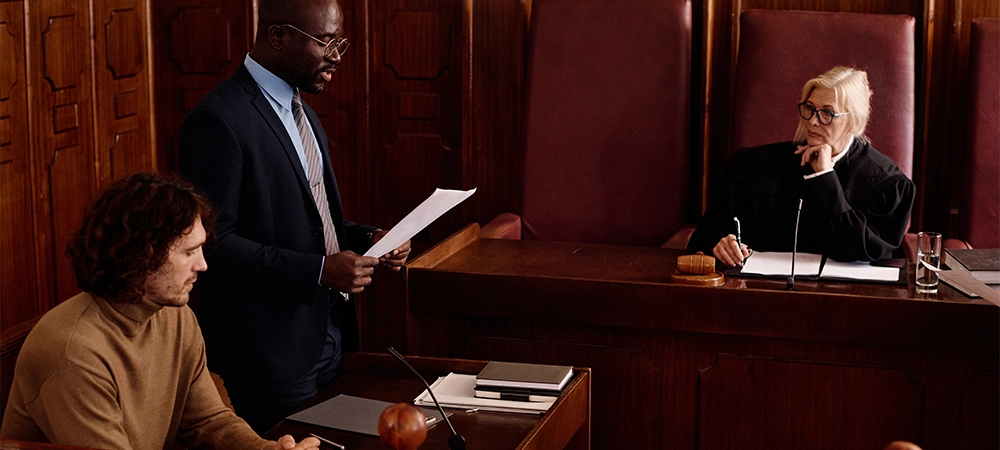Cross-examination is perhaps the most famous part of a trial. This is the dramatic part in many TV shows and movies where weaknesses in a case may come to light. While these shows are usually overly dramatized, cross-examination can often be key to the outcome of a real-life trial.
For defence lawyers, cross-examination is a crucial skill needed to win a case. It can be a strategic weapon that can be the difference between conviction and acquittal. Read on as we take a deep dive into the importance of cross-examination in a criminal trial.
The Purpose of Cross-Examination
It’s called a cross-examination as the two sides of the case are crossed over. Here, it’s a defence lawyer questioning one of the prosecution’s witnesses and the complainant, or the prosecution questioning the accused (if they want to testify) or one of the defence’s witnesses.
The cross-examination will happen after a direct examination, where a witness is called and initially questioned by the side of the case they are on. There are a number of reasons why a cross-examination can be important:
- To test the truthfulness and reliability of a witness’s testimony
- To expose biases or motives to lie
- To clarify vague or ambiguous statements
- To introduce doubt about the prosecution’s version of events
Related Article: https://www.agpllp.ca/the-process-of-a-criminal-trial-in-ottawa/
Cross-Examination and Credibility
One of the most significant ways cross-examination can be effective is by attacking the credibility of the witness. An experienced criminal defence lawyer will look to exploit dishonesty, mistakes, and inconsistencies in a prosecution’s witnesses.
This can be vitally important for the burden of proof. The defence is not required to prove innocence. Instead, it merely must show that reasonable doubt exists. Reducing the credibility of a witness is a hugely effective way of doing that.
There are many ways this doubt could be cast. A skilled lawyer will not only go in with a predetermined strategy but also be able to highlight and expose a witness’s responses in the moment. A bad lawyer will have a weak strategy and not be able to think on their feet.
A lack of witness credibility can be the thread a lawyer pulls to unravel the whole case. Exposing credibility is often something that sticks in the minds of judges and juries. A defence lawyer will extensively prep their own witnesses so their credibility remains strong through their cross-examination.
Related Article: https://www.agpllp.ca/what-is-the-role-of-a-prosecutor-in-the-criminal-justice-system/

Cross-Examining Police and Experts
Police and experts should always be impartial in the case. This means there shouldn’t be any lies or ulterior motives. However, they are not immune to mistakes, bias, or overreach. They can be cross-examined too, but deep knowledge and preparation are often required to do this effectively.
For example, even an honest and good police officer can be used to cast doubt on the case. A lawyer may highlight how visibility was poor, there are gaps in their training, or they were relying on what they were told and not directly observed.
For experts, it may be errors in the way evidence was collected, challenging assumptions, or the methodology used. Even subtle weaknesses can show that the testimony from these often reliable witnesses may not be as watertight as once seemed.
Strategy Over Showmanship
You shouldn’t be expecting a lawyer to make a huge show like we see in many courtroom dramas. Cross-examination is often methodical. Each enquiry is calculated to lead the witness towards a contradiction or admission.
In Canada, many criminal trials are conducted by judges alone. They aren’t going to be easily swayed by charm and charisma. Instead, they will listen to evidence closely and will be quick to notice any inconsistencies from a witness.
Instead of one “gotcha” moment, a lawyer will usually look to build up a weight of evidence to cast doubt on a case. While showmanship can help to convey a point, there is no substitute for having a clear and effective strategy.
Shaping the Narrative
A part of that strategy is often shaping the narrative. This is when the defence will present their own theory of what happened. They will then use cross-examination to shape the narrative and lead the judge or jury to consider it reasonable to think a different version of events occurred.
For example, the defence may say the accused acted in self-defence. They may shape the narrative that a key witness is unreliable, as they didn’t see the full chain of events, or challenge credibility, stating they have a personal relationship with the complainant.
They will subtly shape the narrative by asking a series of questions with the intent to plant seeds of doubt in the case. With the burden of proof being on the prosecution, this can be an effective way for the defence to get a positive outcome for their client.
Final Thoughts
The importance of cross-examination in a criminal trial cannot be overstated. It’s a powerful tool in a defence lawyer’s arsenal. When done effectively with a clear strategy, it can dismantle the prosecution’s case.
Hiring an experienced lawyer can often be the difference between a successful cross-examination and a failed one. If you require experienced legal counsel, contact AGP LLP today. We’ll be happy to offer you a free consultation to see how we can advocate on your behalf.
